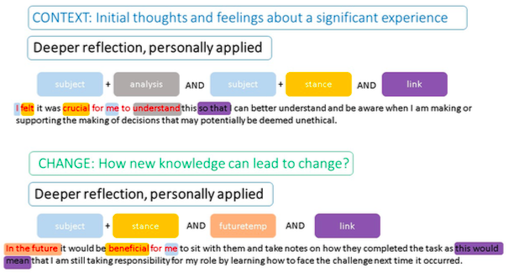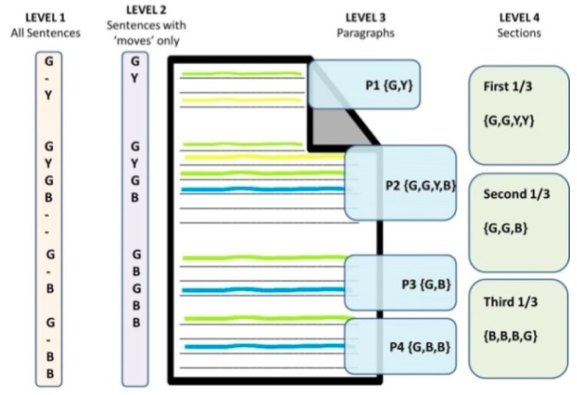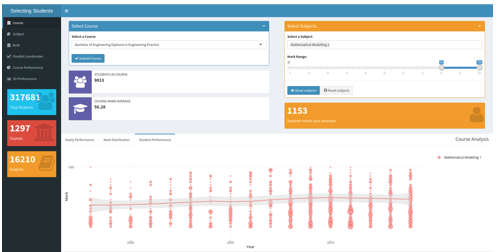Time: 09:00 AM
Location: Vancouver, BC, Canada
CIC recently shared its work in diverse forms and topics at the 7th International Conference on Learning Analytics & Knowledge (LAK17). LAK17 was held in Vancouver, Canada from March 13-17, 2017 and was organised by the Society for Learning Analytics Research (SOLAR). This annual conference brings together a diversity of researchers focused on the many transdisciplinary fields associated with learning analytics and provides a forum to address critical issues and challenges confronting the education sector today. The accepted papers were from CIC’s close collaborations with academics from multiple faculties across UTS (Health; Law; Engineering; Science), based on the analytics innovations we’re piloting with them. The workshops/tutorials presented by CIC team members were based on our national and international collaborations.
Paper 1:
Gibson, A., Aitken, A., Sándor, Á., Buckingham Shum, S., Tsingos-Lucas, C. and Knight, S. (2017). Reflective Writing Analytics for Actionable Feedback. Proceedings of LAK17: 7th International Conference on Learning Analytics & Knowledge, March 13-17, 2017, Vancouver, BC, Canada. (ACM Press). DOI: http://dx.doi.org/10.1145/3027385.3027436. [Preprint]
 Reflective writing can provide a powerful way for students to integrate professional experience and academic learning. However, writing reflectively requires high quality action- able feedback, which is time-consuming to provide at scale. This paper reports progress on the design, implementation, and validation of a Reflective Writing Analytics platform to provide actionable feedback within a tertiary authentic assessment context. The contributions are: (1) a new con- ceptual framework for reflective writing; (2) a computational approach to modelling reflective writing, deriving analytics, and providing feedback; (3) the pedagogical and user ex- perience rationale for platform design decisions; and (4) a pilot in a student learning context, with preliminary data on educator and student acceptance, and the extent to which we can evidence that the software provided actionable feedback for reflective writing.
Reflective writing can provide a powerful way for students to integrate professional experience and academic learning. However, writing reflectively requires high quality action- able feedback, which is time-consuming to provide at scale. This paper reports progress on the design, implementation, and validation of a Reflective Writing Analytics platform to provide actionable feedback within a tertiary authentic assessment context. The contributions are: (1) a new con- ceptual framework for reflective writing; (2) a computational approach to modelling reflective writing, deriving analytics, and providing feedback; (3) the pedagogical and user ex- perience rationale for platform design decisions; and (4) a pilot in a student learning context, with preliminary data on educator and student acceptance, and the extent to which we can evidence that the software provided actionable feedback for reflective writing.
Paper 2:
Martinez-Maldonado, R., Power, T., Hayes, C., Abdipranoto, A., Vo, T., Axisa, C., and Buckingham-Shum, S. (2017) Analytics Meet Patient Manikins: Challenges in an Authentic Small-Group Healthcare Simulation Classroom. Proceedings of LAK17: 7th International Conference on Learning Analytics & Knowledge, March 13-17, 2017, Vancouver, BC, Canada. (ACM Press).
 Healthcare simulations are hands-on learning experiences aimed at allowing students to practice essential skills that they may need when working with real patients in the clinical environment. Some clinical classrooms are equipped with simulated patient manikins that can respond to actions or that can be programmed to deteriorate over time. Students can perform assessments and interventions, and enhance their critical thinking and communication skills. There is an opportunity to exploit the students’ digital footprints that these simulators can pervasively capture to make key aspects of the learning process visible. The setting can be augmented with sensors to capture traces of group interaction. This multimodal data can be used to generate visualisations or feedback for students or teachers. This paper reports on an authentic classroom study using analytics to collect and integrate multimodal data of students’ interactions with the manikins and their peers in simulation scenarios. We report on the challenges encountered in deploying such analytics ‘in the wild’, using an analysis framework that considers the social, epistemic and physical dimensions of collocated collaborative activity.
Healthcare simulations are hands-on learning experiences aimed at allowing students to practice essential skills that they may need when working with real patients in the clinical environment. Some clinical classrooms are equipped with simulated patient manikins that can respond to actions or that can be programmed to deteriorate over time. Students can perform assessments and interventions, and enhance their critical thinking and communication skills. There is an opportunity to exploit the students’ digital footprints that these simulators can pervasively capture to make key aspects of the learning process visible. The setting can be augmented with sensors to capture traces of group interaction. This multimodal data can be used to generate visualisations or feedback for students or teachers. This paper reports on an authentic classroom study using analytics to collect and integrate multimodal data of students’ interactions with the manikins and their peers in simulation scenarios. We report on the challenges encountered in deploying such analytics ‘in the wild’, using an analysis framework that considers the social, epistemic and physical dimensions of collocated collaborative activity.
Paper 3:
Knight, S., Martinez-Maldonado, R., Gibson, A. and Buckingham-Shum, S. (2017) Towards Mining Sequences and Dispersion of Rhetorical Moves in Student Written Texts.Proceedings of LAK17: 7th International Conference on Learning Analytics & Knowledge, March 13-17, 2017, Vancouver, BC, Canada. (ACM Press).
 There is an increasing interest in the analysis of both student’s writing and the temporal aspects of learning data. The analysis of higher-level learning features in writing contexts requires analyses of data that could be characterised in terms of the sequences and processes of textual features present. This paper (1) discusses the extant literature on sequential and process analyses of writing; and, based on this and our own first-hand experience on sequential analysis, (2) proposes a number of approaches to both preprocess and analyse sequences in whole-texts. We illustrate how the approaches could be applied to examples drawn from our own datasets of ‘rhetorical moves’ in written texts, and the potential each approach holds for providing insight into that data. Work is in progress to apply this model to provide empirical insights. Although, similar sequence or process mining techniques have not yet been applied to student writing, techniques applied to event data could readily be operationalised to undercover patterns in texts.
There is an increasing interest in the analysis of both student’s writing and the temporal aspects of learning data. The analysis of higher-level learning features in writing contexts requires analyses of data that could be characterised in terms of the sequences and processes of textual features present. This paper (1) discusses the extant literature on sequential and process analyses of writing; and, based on this and our own first-hand experience on sequential analysis, (2) proposes a number of approaches to both preprocess and analyse sequences in whole-texts. We illustrate how the approaches could be applied to examples drawn from our own datasets of ‘rhetorical moves’ in written texts, and the potential each approach holds for providing insight into that data. Work is in progress to apply this model to provide empirical insights. Although, similar sequence or process mining techniques have not yet been applied to student writing, techniques applied to event data could readily be operationalised to undercover patterns in texts.
Conference Poster:
Jurgen Schulte, Pedro Fernandez de Mendonca, Roberto Martinez-Maldonado and Simon Buckingham Shum (2017). Large Scale Predictive Process Mining and Analytics of University Degree Courses. Poster: LAK17: 7th International Conference on Learning Analytics & Knowledge, March 13-17, 2017, Vancouver, BC, Canada

The workshops that the team c0-chaired:
Cross-LAK: Learning Analytics Across Physical and Digital Spaces
Date: Monday 13 March 2017. 8:30 – 17:00
Abstract: Student’s learning happens where the learner is rather than being constrained to a single physical or digital environment. It is of high relevance for the LAK community to provide analytics support in blended learning scenarios where students can interact at diverse learning spaces and with a variety of educational tools. This workshop aims to gather the sub-community of LAK researchers, learning scientists and researchers in other areas, interested in the intersection between ubiquitous, mobile and/or classroom learning analytics. The underlying concern is how to integrate and coordinate learning analytics seeking to understand the particular pedagogical needs and context constraints to provide learning analytics support across digital and physical spaces. The goals of the workshop are to consolidate the Cross-LAK sub-community and provide a forum for idea generation that can build up further collaborations. The workshop will also serve to disseminate current work in the area by both producing proceedings of research papers and working towards a journal special issue.
LAK17: Writing Analytics Literacy – Bridging from Research to Practice
Date: Full day workshop on 14th March 2017
Abstract: Broadly defined, writing analytics involves the measurement and analysis of written texts for the purpose of understanding writing processes and products, in their educational contexts. Writing analytics are ultimately aimed at improving the educational contexts in which writing is most prominent. The principal goal of writing analytics is to move beyond assessment of texts divorced from contexts, transitioning instead to a more nuanced investigation of how analytics may be effectively deployed in different writing contexts. Writing analytics thus aims to employ learning analytics to develop a deeper understanding of writing skills.
Connecting Data with Student Support Actions in a Course: A Hands-on Tutorial
Date: Tuesday 14 March 2017, 8.30-12.30pm
Abstract: The amount of data extracted from learning experiences has grown at an astonishing pace both in depth due to the increasing variety of data sources, and in breath with courses now being offered to massive student cohorts. However, in this emerging scenario instructors are now facing the challenge of connecting the knowledge emerging from data analysis with the provision of meaningful support actions to students within the context of an instructional design. The objective of this tutorial is to give attendees a set of hypothetical scenarios in which the knowledge extracted from a learning experience needs to be used to provide frequent personalized feedback to students.
Dear Learner: Participatory Visualisation of Learning Data for Sensemaking
Date: Wednesday 15th March 2017, 12.00pm – 3.00pm
Abstract: We discuss the application of a hand-drawn self-visualization approach to learner-data, to draw attention to the space of representational possibilities, the power of representation interactions, and the performativity of information representation.
